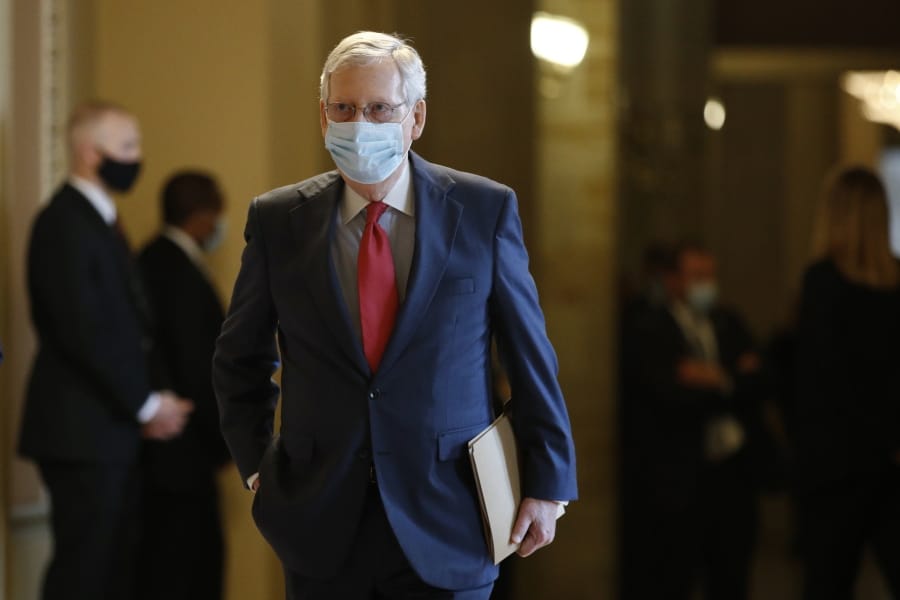WASHINGTON — The Senate considers itself world’s greatest deliberative body, but it’s debating almost anything but the coronavirus as Americans confront a crisis unlike any in modern history.
It’s as if the challenge has created a split screen in the Senate. On one side is a Senate clamoring for a quick response to the outbreak. On the other is the wait-and-see Senate hitting pause on swift action and carrying on with nonpandemic business.
President Donald Trump on Thursday said he met with Senate Majority Leader Mitch McConnell, R-Ky., at the White House to discuss the next steps on an aid package.
As senators prepare for a weeklong Memorial Day break, the difference provides a study in contrasts and priorities, one that reflects the partisan split between Republicans and Democrats and is defining both before the 2020 election.
“You wouldn’t even know there’s a COVID crisis,” Senate Democratic leader Chuck Schumer of New York told ABC’s “The View.” “Crazy. It’s just so wrong.”
While the House works remotely, the lights-on Senate has the legislative stage to itself. But despite a virus death toll nearing 100,000 in the United States and more than 30 million unemployed, the slow-moving Senate is proving that even a pandemic won’t quicken its pace.
At least one Republican, Sen. Cory Gardner of Colorado, pledged to try to prevent the Senate from recessing unless it votes on more aid, particularly to states and cities facing layoffs.
“Now is not the time for the Senate to go home,” tweeted Gardner, who is among the most politically endangered GOP senators running for reelection in the fall. He told reporters he had called Trump to express his concerns.
McConnell argued that his side of the Capitol led passage of an earlier package that cost $2 trillion. Better to assess how that money is being spent, he said, before approving more. He rejects the new $3 trillion package approved by the Democratic-led House last week as a “liberal wish list.”
On Thursday, McConnell mocked the House for working remotely while senators in masks show up like other Americans returning to work. He derided as constitutionally unsound a historic House rules change that allows representatives to vote by proxy rather than risk traveling to Washington. The District of Columbia remains under stay-home orders through June 8.
“The self-described ‘People’s House’ has been suspiciously empty of people,” McConnell said. “Every one of my Senate colleagues should be proud of how we’ve helped our nation win this first battle.”
House Speaker Nancy Pelosi, D-Calif., shot back: “We have the Heroes bill,” she said about the latest House-passed aid measure. “He has the zeroes bill.”
The different approaches were on display throughout the Senate’s side of the Capitol complex — in the Senate chamber, its committee rooms, even its private caucus meetings.
Senators confirmed a new Federal Election Commission member, several federal judges and Trump’s nominee for director of national intelligence, John Ratcliffe.
In the committee rooms, marquee hearings focused on investigations of the Obama administration stemming from the investigation of Russian interference in the 2016 election.
The Senate Homeland Security and Governmental Affairs Committee on Wednesday voted to issue a subpoena for its investigation into Hunter Biden, the son of presumed Democratic presidential nominee Joe Biden, though there’s no evidence of wrongdoing by either Biden.
Even behind closed doors, the differences can be seen and heard.
Trump arrived on Capitol Hill for an impromptu visit to the Senate Republican lunch Tuesday that quickly turned to politics. The president promoted his own poll numbers and implored his allies to “be tough” as they fight for their jobs this fall. Democrats are trying to gain the majority and flip control.
In contrast, Democratic senators, who no longer meet for lunch but convene by conference call, heard Wednesday from economist Mark Zandi, who warned them of the risks of inaction.
Zandi said “Job No. 1” for Congress was sending money “quickly” to state and local governments are “teetering” on the financial edge, according to a Democrat who was not authorized to discuss the private call and spoke on condition of anonymity. Without aid, hundreds of thousands of more jobs could be lost, he said.
Republicans are hopeful that as states reopen, the economy will improve, lessening the need for more federal funds.
But polling shows Americans are concerned about a second wave of the virus as shops and workplaces reopen. A poll by The Associated Press-NORC Center for Public Affairs Research found 83% of Americans are at least somewhat concerned that lifting restrictions in their area will lead to additional infections, with 54% saying they are very or extremely concerned.



